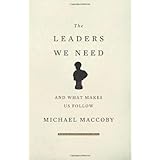
Average Reviews:

(More customer reviews)We need Michael Maccoby's insights about leaders and our world today to follow or become The Leaders We Need. People don't want to be managed by autocratic father figures, though they will follow and better yet, collaborate with, the right kind of leader. This book is trenchant and practical.
Disclaimer: Michael Maccoby and I have worked together for 35 years. For some this might imply a lack of objectivity. For others, this qualifies a reviewer who knows his subject. You are free to make up your own mind.
Dr. Maccoby's insights are based on over 45 years of research (for example, with Erich Fromm in Mexico), teaching (Harvard, Chicago, Oxford, the Brookings Institution), consulting (IBM, AT&T, World Bank, ABB, etc.), and writing. He facilitated a national health care coalition, and directed a foundation-funded research project on exemplary health care systems. He advises diverse leaders and organizations, being trusted by both corporate and union leaders. He is a fellow of the American Psychological and Anthropological Associations, a psychologist, psychoanalyst, and anthropologist.
The Leaders We Need And What Makes Us Follow provides many examples of leaders and their organizations from this rich body of work. It is his most comprehensive book, giving readers the fruits of his productive lifetime in what might be called a grand integrated theory. His wisdom is useful for those who would lead in any way or at any level of an organization, or for understanding leaders we may choose to follow.
He raises the question why none of the existing authors on leadership give a convincing definition of leadership. Many describe leadership traits, others define their ideal leader. Maccoby's definition of a leader is deceptively simple: a leader is a person others follow.
Since both Hitler and Gandhi were people others followed, Maccoby asks: why and how do people follow a leader? Winston Churchill, a great wartime leader, was rejected by voters both before and after the war. Different contexts require different leaders.
Maccoby understands leaders in their historical context, relationship to followers, and results sought. Personality is also important. The most effective leaders will develop their Personality Intelligence, a combination of conceptual and emotional understanding, head and heart.
At the national level, we need leaders who can respond to a world aflame with fundamentalist ideologies, the global ecological crisis, and an increasing percentage of the world facing inadequate food, water, shelter, health. At the organizational level, we need leaders who can organize and inspire knowledge workers in healthcare organizations, schools, and innovative global companies. Traditional bureaucratic managers who built great corporations and government agencies of the industrial era lack the personality and understanding needed to engage a new social character, raised in dual career families rather than the paternalistic families of the past.
The new interactive social character is composed of free agents motivated by continual learning, teamwork, transparency, participation and above all, meaningful purpose. If led as collaborators they are a source of ideas, energy, and solutions. But they are turned off by rules and carrot and stick-based managers. Maccoby describes the changing attitudes of the interactives who don't idealize father figures; and the various kinds of intelligence needed to lead today.
Maccoby writes that leaders need foresight and systems thinking, and he models it. He describes leaders who are resolving today's challenges: transforming health care; creating schools that educate poor minority students who go on to college; an orphanage run on humanitarian principles where graduates lead the organization in eight countries. Maccoby shows that in the most effective knowledge creating organization, different leadership roles-- strategic, operational, and networking-- work together, and that these roles are best filled by different personality types. In "The President We Need" chapter we gain understanding to help us predict how candidates will act once elected. This book is a significant contribution, useful for would-be leaders and followers.
Click Here to see more reviews about: The Leaders We Need: And What Makes Us Follow
Click here for more information about The Leaders We Need: And What Makes Us Follow

